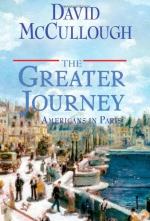
|
| Name: _________________________ | Period: ___________________ |
This test consists of 15 multiple choice questions and 5 short answer questions.
Multiple Choice Questions
1. What was Emma Willard's profession?
(a) Lawyer.
(b) Artist.
(c) Schoolmistress and textbook writer.
(d) Doctor in training.
2. What was Charles Stratton's stage name?
(a) Andre the Giant.
(b) Tiny Tim.
(c) Tom Thumb.
(d) The Rock.
3. What requirement did the Ecole de Medecine have that American medical schools did not?
(a) A PhD.
(b) A college degree.
(c) A high school degree.
(d) A recommendation from a practicing doctor.
4. Where did many Americans in the 1830s get their information on Paris and its culture?
(a) From the newspapers and literature.
(b) From gossip.
(c) From previous travels.
(d) From the styles and art of Paris.
5. Why did Elizabeth Blackwell go to Paris?
(a) To further her general education.
(b) To further her legal education.
(c) To further her medical education.
(d) To further her artistic education.
6. For what reason did George Healy return to America after eight years in 1842?
(a) To visit his parents.
(b) To paint Andrew Jackson.
(c) To paint a copy of Gilbert Stuart's portrait of Washington.
(d) To paint John Quincy Adams.
7. Who is the only one of New England's immortals, famous writers and intellectuals, who never went to Paris?
(a) Henry Wadsworth Longfellow.
(b) Ralph Waldo Emerson.
(c) Herman Melville.
(d) Henry Thoreau.
8. Who was William Wells Brown?
(a) A doctor and fugitive slave.
(b) An artist and writer.
(c) A politician and abolitionist.
(d) A writer, abolitionist, and fugitive slave.
9. What were omnibuses?
(a) Giant, horse-drawn public conveyances.
(b) Double rider bikes.
(c) Large wheelchairs.
(d) Double-decker boats that traveled the Seine.
10. Who is Natty Bumppo?
(a) George Healy's uncle.
(b) Oliver Wendell Holmes' cousin.
(c) A character in several James Fenimore Cooper's novels.
(d) Samuel Morse's daughter.
11. What two specialties did the Ecole de Medecine offer its students?
(a) Surgery and gynecology.
(b) Surgery and pediatrics.
(c) General medicine and geriatric medicine.
(d) Surgery and general medicine.
12. What did many Americans quickly discover about the economy in France as compared to America?
(a) The cost of living in France was much lower than America.
(b) Taxes in France were much higher.
(c) The economy in France was less stable than America.
(d) Incomes in France were much lower.
13. What type of people did John Collins Warren offer his son upon his journey to Paris?
(a) To avoid those who did not attend church regularly.
(b) To embrace those of a serious mind like his own.
(c) To embrace those with similar tastes.
(d) To avoid those fond of theaters and dissipation.
14. What American building did Pierre-Charles L'Enfant design?
(a) The Capitol.
(b) Mount Vernon.
(c) The White House.
(d) The Pentagon.
15. Who was Benjamin Franklin?
(a) A French teacher.
(b) An American diplomat, politician, writer, and inventor.
(c) A French immigrant.
(d) An American artist in Paris.
Short Answer Questions
1. Why was Charles Stratton unique?
2. Who was the Marquis de Lafayette?
3. What did Americans find unusual about the length of a day in Paris?
4. To whom does the author of this book compare James Fenimore Cooper's popularity in Paris?
5. Who does the author mention suffered terrible seasickness on his journey to Paris?
|
This section contains 549 words (approx. 2 pages at 300 words per page) |

|




